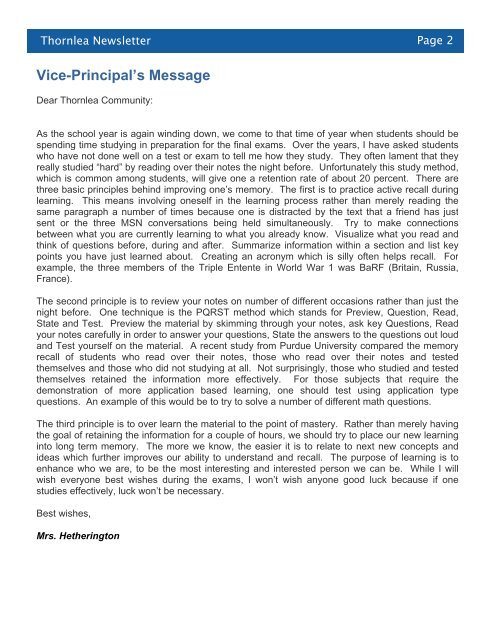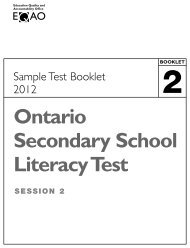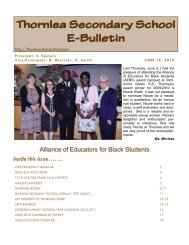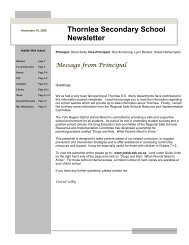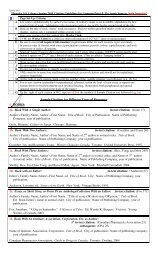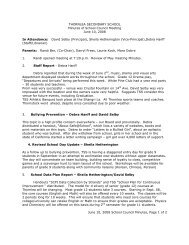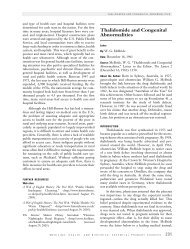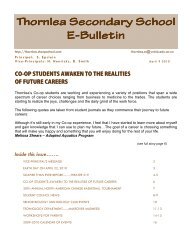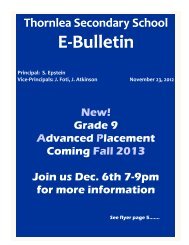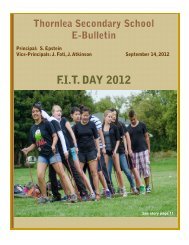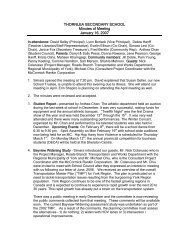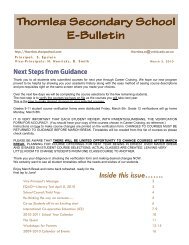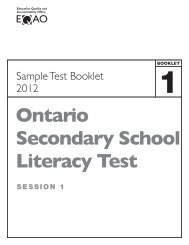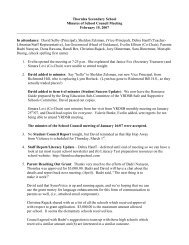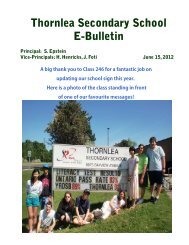June 5 2009 - Thornlea - SharpSchool
June 5 2009 - Thornlea - SharpSchool
June 5 2009 - Thornlea - SharpSchool
You also want an ePaper? Increase the reach of your titles
YUMPU automatically turns print PDFs into web optimized ePapers that Google loves.
<strong>Thornlea</strong> Newsletter Page 2<br />
Vice-Principal’s Message<br />
Dear <strong>Thornlea</strong> Community:<br />
As the school year is again winding down, we come to that time of year when students should be<br />
spending time studying in preparation for the final exams. Over the years, I have asked students<br />
who have not done well on a test or exam to tell me how they study. They often lament that they<br />
really studied “hard” by reading over their notes the night before. Unfortunately this study method,<br />
which is common among students, will give one a retention rate of about 20 percent. There are<br />
three basic principles behind improving one’s memory. The first is to practice active recall during<br />
learning. This means involving oneself in the learning process rather than merely reading the<br />
same paragraph a number of times because one is distracted by the text that a friend has just<br />
sent or the three MSN conversations being held simultaneously. Try to make connections<br />
between what you are currently learning to what you already know. Visualize what you read and<br />
think of questions before, during and after. Summarize information within a section and list key<br />
points you have just learned about. Creating an acronym which is silly often helps recall. For<br />
example, the three members of the Triple Entente in World War 1 was BaRF (Britain, Russia,<br />
France).<br />
The second principle is to review your notes on number of different occasions rather than just the<br />
night before. One technique is the PQRST method which stands for Preview, Question, Read,<br />
State and Test. Preview the material by skimming through your notes, ask key Questions, Read<br />
your notes carefully in order to answer your questions, State the answers to the questions out loud<br />
and Test yourself on the material. A recent study from Purdue University compared the memory<br />
recall of students who read over their notes, those who read over their notes and tested<br />
themselves and those who did not studying at all. Not surprisingly, those who studied and tested<br />
themselves retained the information more effectively. For those subjects that require the<br />
demonstration of more application based learning, one should test using application type<br />
questions. An example of this would be to try to solve a number of different math questions.<br />
The third principle is to over learn the material to the point of mastery. Rather than merely having<br />
the goal of retaining the information for a couple of hours, we should try to place our new learning<br />
into long term memory. The more we know, the easier it is to relate to next new concepts and<br />
ideas which further improves our ability to understand and recall. The purpose of learning is to<br />
enhance who we are, to be the most interesting and interested person we can be. While I will<br />
wish everyone best wishes during the exams, I won’t wish anyone good luck because if one<br />
studies effectively, luck won’t be necessary.<br />
Best wishes,<br />
Mrs. Hetherington


